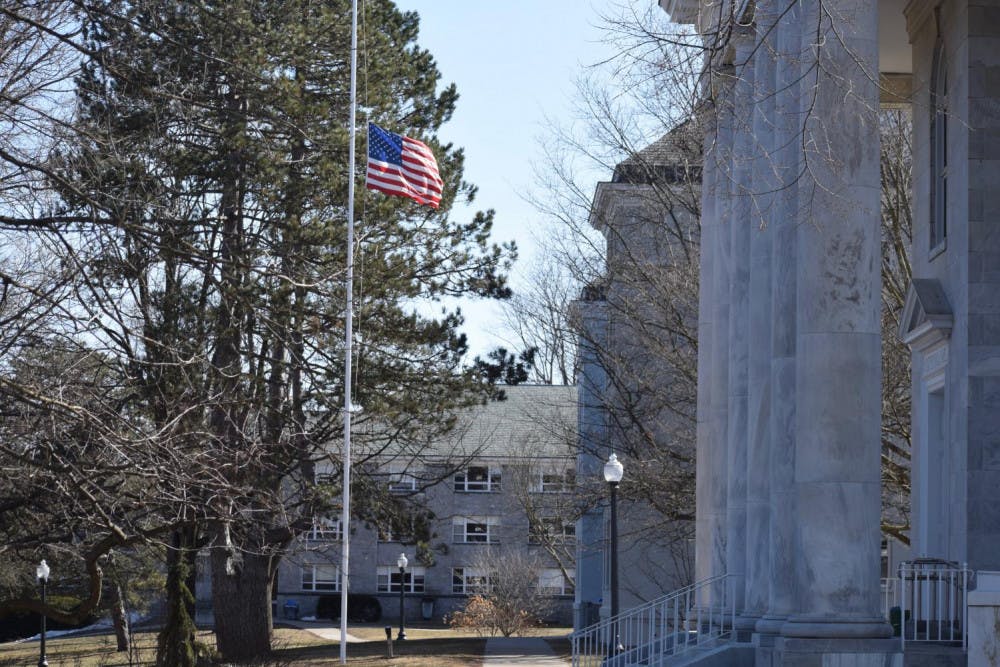Eight people, including six women of Asian descent, were killed when a gunman entered three Atlanta spas on March 16. The tragedy drew attention to the increase in anti-Asian hate crimes that has coincided with inflammatory rhetoric surrounding Covid-19 throughout the past year. Following the shooting, various Asian and Asian-American affinity groups at Middlebury have responded to the tragedy, voicing their solidarity alongside each other and working to start larger conversations around anti-Asian racism and oppression.
RAISINS (Radical Asians)
RAISINS (Radical Asians), a collective of Asian and Asian-American student activists with a focus on community building and social justice, hosted a public forum over Zoom following the shooting.
Max Walters ’24, a RAISINS member who spearheaded the event, said the purpose of the forum was for Asian and Asian American students to share their experiences of anti-Asian racism and for non-Asian students to hear those stories. The 16 attendees shared an intimate space to voice vulnerable emotions.
“The main reason for me to do this is that I am feeling strained, conflicted and uncertain about what I was feeling, and I was hearing so many different stories and reactions, being angry, sad or devoid of emotions,” Walters said.
Many themes were brought up during the event such as the fetishization of Asian women and the myth of the “model minority.” Walters said he felt motivated to speak up as a response to the shooting because he felt the Asian-American experience is often silenced or sidelined in national discussion. Walters hopes that the attention from mainstream media can build momentum for further conversations through RAISINS and in the community.
Each year, RAISINS releases a digital zine highlighting a social issue affecting the Asian American and Pacific Islander (AAPI) community. To provide resources and further information on the shooting, RAISINS member Melanie Chow ’22 made revisions and redistributed the RAISINS zine from 2019 on Asian Americans’ sexual experiences. The zine includes historical context of Asian fetishization and the sexualized portrayal of Asian Americans in the media.
ASIA (Asian Students in Action)
ASIA (Asian Students in Action), a pan-Asian cultural organization aiming to provide structural support for Asian students on campus, helped advertise the RAISINS open forum event. ASIA is currently working on opportunities for workshops, conferences and career-oriented networking, and aims to build community through cultural gatherings and peer connections.
Anton Gallegos ’21, co-president of ASIA, emphasized to The Campus the importance of amplifying Middlebury’s Asian voices to uplift other activist work and encouraged Asian and non-Asian students to continue educating themselves.
“There’s a lot of value talking amongst yourselves and becoming informed on the history of what’s going on. Make that dedicated effort, and you’ll learn a lot,” Gallegos said. “There is so much room for educating.”
SEAS (South East Asian Society)
SEAS (South East Asian Society) is the cultural organization for people who are interested in Southeast Asian culture. In the last year, SEAS has been working on community building through bi-weekly meetings, hosting events such as professor talks, trivia, letter writing and cooking.
“We’re dancing together for the ISO nocturne show, which lifts our spirits. It’s been about coming together as a community to stand in solidarity and feel each other’s presence,” said Pim Singhatiraj ’21, president of SEAS.
KASA (Korean American Student Association)
KASA (Korean American Student Association) is a cultural organization established for students with Korean cultural backgrounds or those who appreciate the Korean language and culture. KASA events have previously centered around food, but in the past year, KASA has also been holding regular Korean language table sessions for students to practice speaking Korean, along with weekly language workshops.
Following the shooting in Atlanta, KASA sent out an acknowledgement of the event and offered space for support in the organization’s Facebook group. Eunice Choi ’21, co-president of KASA, told The Campus that many members of the group were strongly impacted by the Atlanta shooting, as some of the victims were of Korean descent. Choi, whose mother owns a nail salon, expressed fear and concern for her family’s well-being.
“My heart ached for the family members of the victims,” Choi said. “I couldn’t fathom the pain the victims at the moment went through and their family members afterward, but I still resonated a lot with the event, which was really hard for me to take in.”
While the shooting in Atlanta was captured by mainstream media, anti-Asian hate and racism is the ongoing reality for members of the Asian community. During the RAISINS public forum event, Walters observed that while everyone expressed grief, most Asian students were unsurprised by the shooting due to the escalating hate and violence against Asian-Americans in the last year.
“From my personal experience, I was hearing about these events every day,” Walters said, “So when I heard about the Atlanta shooting, I was not surprised, and I didn’t have a big reaction. Through the talk, I learned that a lot of people felt the same way.”
Editor’s note: Rachel Lu ’23 is a member of RAISINS.
Asian affinity groups process grief, anger after Atlanta shootings

Benjy Renton
President Biden ordered that flags be lowered to half mast following the March 16 Atlanta spa shootings that left eight dead.
President Biden ordered that flags be lowered to half mast following the March 16 Atlanta spa shootings that left eight dead.
Comments



